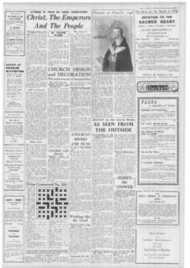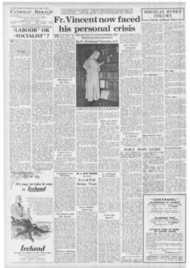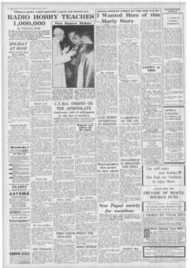Page 6, 3rd June 1955
Page 6

Report an error
Noticed an error on this page?If you've noticed an error in this article please click here to report it.
Tags
Share
Related articles
Red Aims Are No Mystery
The B.m.c. Strike
Trade Union Men Support The Cardinal's Appeal
Catholic Social Teaching Applied To London Bus Strike
Threat Of Colour Bar Here
SLACKERS TAKE THE BENEFIT
No-one—unions or bosses—
will say 'No' to him
AN EN-MINEB
FULL employment has caused industrial morale (one night almost say morals) to sink almost to zero.
That is why there are so many strikes and threats of strikes. Never has the truth of the old saying that the more you get the more you want been so clearly proved.
Even so, it is difficult to believe that the unending demands are all made honestly. The average Christian must often get the impression that their framers have tongue in cheek. If not, human selfishness and greed have no limit nor any shame,
Opportunism and lack of principle are not confined to the workers, however. Not long ago I was at a debate between a personnel officer and a site engineer. This followed a meeting with some A.E.U. officials who demanded at least a week's wages in lieu of notice for a man who had been sacked for taking too long for dinner after being warned about it. The union officials had threatened to black-list the firm and interfere with work on all their contracts.
" What are we going to do about it ? " asked the engineer.
" It depends on the labour position," said the personnel officer. " If we can get plenty of skilled men to take the places of the A.E.U. men we've got, we needn't do anything. If not. we'll have to give them something."
Little wonder that workers are equally cynical especially when they read of the dividends and " ploughshares " handed out to idle capitalists.
No penalty
THE "guerilla strikes" are a typical example of industrial immorality.
Nobody denies the worker's right to strike, to withdraw his labour if he is not satisfied with his pay or conditions. But the union-directed strikes in certain places on certain days to try to enforce demands that could be submitted to arbitration are neither moral nor legal.
When angry miners stage a lightning strike they are usually sued for damages for breach of contract. But so far no other workers have been sued for ceasing work without notice. Presumably employers fear to make matters worse by claiming their due.
First victim of full employment was punctuality, There was a time when a worker who did not arrive punctually at mine, shipyard or factory was not allowed to work that day. Now thousands of workers start when they like and grumble about being docked for the time they Lose—on the average half an hour per man per day at many establishments.
Ten-minute tea breaks often last half an hour. At most big works there is always a long queue at the canteen at 11.50 a.m. and a longer one at the yard gate at 4.50 p.m.
I know a yard Manager who tried to disperse one of these queues. He was punched in the face and the queues were as long as ever next day.
Foremen impotent
UNDER full employment the foreman's job has become almost impossible. If he tries to
enforce discipline he soon finds himself in the black books of the union—and he is by no means certain that the management will back him up. So he makes only a feeble pretence of bossing anybody.
The Durham colliery overman who was transferred to a nonsupervisory job after his men caused a strike because he shouted at them is only one of hundreds of victims of subversive unionism.
At most collieries nowadays discipline is largely in the hands of the consultative committee. which is well packed with union officials. These consider it their duty to stick up for their members right or wrong. As a result. cases can he cited of workers coming before the committee half a dozen times without any disciplinary action being taken against them.
Profit-sholrinti
Few workers under 40 take any pride in doing their job properly. All that the younger generation thinks about is getting ac much as possible for doing as little as possible. Every concession granted to them leads to a further demand.
Some men doing a job at a pithead asked if they could use the pithead baths. When permission was given they asked for half an hour extra pay for the time they spent in the baths. When that was granted they wanted another half an hour for changing into their working clothes of a morning. And all the while they were getting twopence an hour extra as " dirt money."
IT is astonishing how some I workers manage to think of the demands they make and the grievances they manufacture, But shop
stewards have to support them all —they would lose their status if they didn't.
The evil that B.E.A. tackled recently is very widespread.
Let the shop stewards call a meeting for after working hours and nobody attends. But let them start one near the end of lunchhour and everybody turns up and the meeting is prolonged until teabreak. Woe betide the foreman who tries to stop it or dock men for the time they spend at it,
So much does the union favour the workshy and the malcontent nowadays that many of the more reasonable workers are coming to regard it as a serious menace to right living.
Probably some compulsory system of profit-sharing and workercontrol for all industrial undertakings, large and small, could put an end to trade unions and bring a little peace and concord into industry. Certainly it would he a very good thing if every worker could he reasonably sure that the better he does his job the better of he will be financially.
At present he is sure of only one thing—that the harder he works the more money he puts into the pockets of the shareholder class. That is what makes trade unions so powerful.
blog comments powered by Disqus









